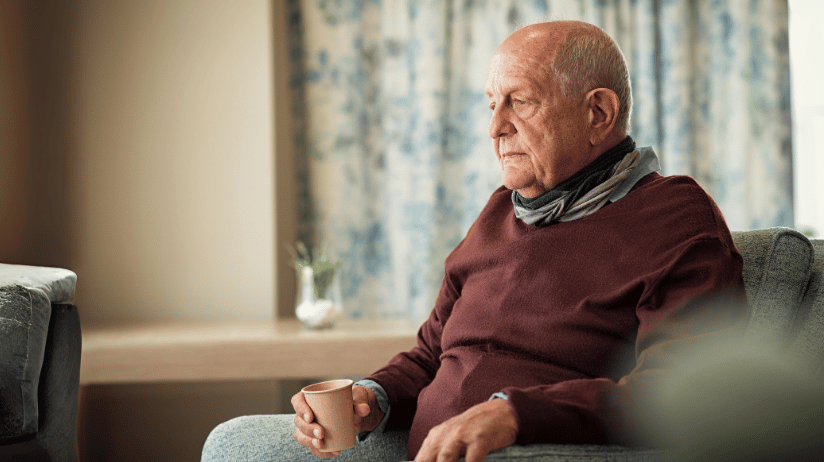As the seasons change, many individuals find themselves struggling with seasonal depression. This mood disorder was formally known as Seasonal Affective Disorder (SAD). It typically occurs during the fall and winter, when daylight hours grow shorter and colder weather keeps us indoors.
Seasonal depression affects people of all ages. However, seniors are often more susceptible due to their increased isolation and loneliness. Let's learn more about seasonal depression and dive into strategies to combat it.
Understanding Seasonal Depression
First, it's essential to understand what seasonal depression is and why it impacts seniors. Seasonal depression is a type of depression that usually occurs during the fall and winter. Doctors do not know exactly why people experience depressive moods during this time of year. However, here are some factors that may contribute to seasonal depression.
- Reduced sunlight: The decrease in daylight hours during the fall and winter can disrupt our circadian rhythms. Changes in daylight affect our body's production of serotonin and melatonin, which help regulate mood and sleep.
- Biological factors: Some individuals may be at a higher risk of feeling depressed because of their genetics. Additionally, hormonal imbalances could also contribute to your risk of seasonal depression.
- Lifestyle: Limited outdoor activity, reduced physical activity, and dietary changes often accompany the winter months, which can negatively impact mood.
- Loneliness and isolation: Adults living alone or who lack social support are particularly susceptible to loneliness and social isolation, which can exacerbate depression symptoms.
RELATED CONTENT: Unexpected Causes of Senior Isolation
Risk Factors of Seasonal Depression in Seniors
Seniors are at a higher risk of suffering from seasonal depression than younger adults. In addition to the mentioned risk factors, there are other risk factors that affect older adults.
- Increased isolation: Many seniors experience social isolation because of physical limitations, loss of loved ones, or decreased mobility. This isolation can be especially challenging during the winter months when outdoor activities are limited. Additionally, the holidays emphasize family and social connections, which can be challenging for older adults living alone.
- Reduced emotional resilience: Seniors may have less emotional resilience to cope with the symptoms of seasonal depression. As a result, they may more likely to experience feelings of hopelessness and despair.
- Pre-existing conditions: Seniors are more likely to have pre-existing mental health conditions, such as depression or anxiety. These existing conditions can worsen symptoms. Other medical conditions and medications can also contribute to increased feelings of depression.
Remember that depression is not a normal part of aging. So, if an aging loved one shows signs of depression, encourage them to get the help that they need.
RELATED CONTENT: Proactive Ways to Deal with Depression in Seniors
Managing Seasonal Depression
No matter what age you are, seasonal depression can truly affect your overall wellbeing. Here are some strategies to help anyone suffering from seasonal depression.
1. Try Light Therapy
Because the shorter days can contribute to seasonal depression, try getting more light! Light therapy involves sitting in front of a light box that emits bright light that mimics natural sunlight. This treatment can help regulate circadian rhythms and improve mood. Seniors should discuss this option with a doctor because the correct dosage and duration of light exposure may vary.
2. Seek Professional Help
In many cases, doctors can help you manage the symptoms of seasonal depression through personalized treatment options. Doctors may prescribe antidepressant medication or suggest therapy with a specialist. Psychologists or psychiatrists can provide therapy and support tailored to your specific needs. Individual or group therapy sessions can offer coping strategies and emotional support.
3. Stay Active
Regular physical activity is a powerful tool in managing depression. Engage in indoor exercises like yoga, stretching, or chair-based workouts. Sign up for a local gym to increase socialization, change your surroundings, and encourage physical activity. Staying active can boost mood, increase energy levels, and improve overall well-being.
RELATED CONTENT: 5 Best Chair Exercises for the Elderly
4. Healthy Diet
A balanced diet rich in whole grains, fruits, vegetables, and lean proteins can have a positive impact on mood. For example, omega-3 fatty acids may improve mental health. Seniors should consult with a healthcare provider or a dietitian to create a meal plan that supports their health.
5. Engage in Hobbies & Interests
Explore your interests and hobbies during colder months. Engaging in activities you enjoy can be a great distraction from seasonal symptoms. Plus, some hobbies provide a sense of purpose and accomplishment. Whether it's reading, painting, knitting, or gardening, hobbies can be an excellent source of joy.
6. Social Connections
Combatting loneliness and isolation is vital for anyone battling seasonal depression. Instead of retreating, maintain and strengthen social connections. Try regular phone calls, video chats, or joining social groups to help stay connected. Many communities offer support and socialization opportunities that can be especially helpful during the winter months.
RELATED CONTENT: Risks of Social Frailty in Older Adults
7. Lighten Up the Home
Make your living spaces brighter and more cheerful to combat seasonal depression. Create a more uplifting atmosphere by using brighter light bulbs, opening curtains, and painting walls in light, warm colors. These changes can help lift the gloom that winter months bring.
Conclusion
Seasonal depression can affect anyone. Luckily, there are many strategies to help combat depression. If you or a loved one experiences seasonal depression, try to be patient with yourself and reach out to loved ones. Work with a doctor to find a personalized treatment plan and make appropriate lifestyle adjustments.


